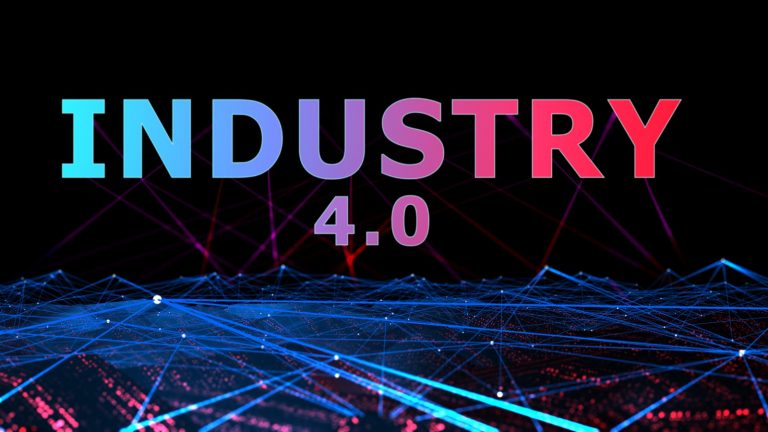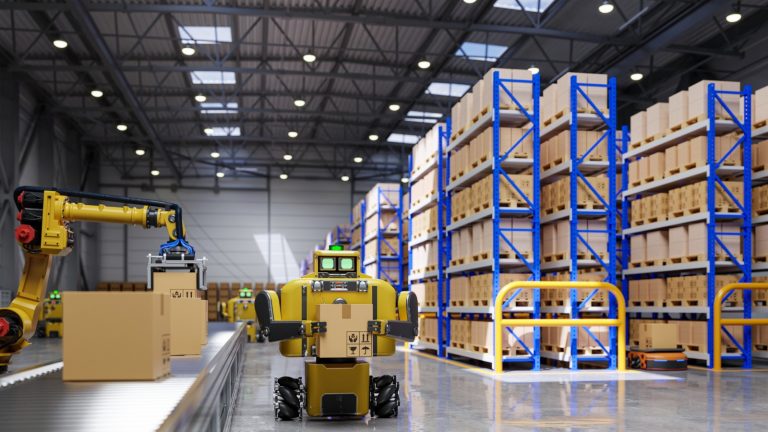Industry 4.0 has been in the limelight for some time now and is rapidly rising in popularity when it comes to the business world. Not less than a technological miracle, Industry 4.0 brings a new vision to the way the industrial world embarks on its business journey, keeping up with ethical values like sustainability. As far as the manufacturing realm is concerned, striking the right balance between gaining profits and sustainability initiatives poses a real challenge. This is where you will need a technological pinnacle like Industry 4.0 capabilities hidden inside your software solutions.
In this article, we explore the true meaning of Industry 4.0 technologies and their utilisation in the manufacturing industry towards achieving sustainability goals in their supply chains.
What is 'Industry 4.0'?

Industry 4.0 is the transformation of conventional commercial procedures via the integration of cutting-edge digital technology into manufacturing and production processes. It includes a variety of cutting-edge technologies such as Robotics, Additive Manufacturing, Big Data Analytics, Artificial Intelligence (AI), and Cyber-Physical Systems.
If you are dreaming of a smarter business future, then Industry 4.0 is the ideal place to anchor. Let us explain how this is possible. Industry 4.0’s primary goal is to establish ‘smart factories,’ or autonomously communicating and cooperating machinery, equipment, and processes. This synergy allows for real-time data collection, analysis, and decision-making, optimising efficiency, productivity, and quality.
This interconnectedness of devices and systems enables predictive maintenance, adaptive production, and customisation on a mass scale.
With the help of sophisticated machinery and creative business models, Industry 4.0 accelerates the shift towards manufacturing ecosystems that are more adaptable, flexible, and networked.
In the end, it improves business responsiveness, sustainability, and competitiveness, opening the door for a better manufacturing future.
Top 7 Ways Industry 4.0 Capabilities Encourage Sustainable Supply Chains for Manufacturing

3D Printing and Additive Manufacturing
Industry 4.0 is empowered to present you with these manufacturing capabilities, which significantly enhance sustainability within supply chain operations. As it permits building products layer by layer from digital designs, these technologies reduce material waste, utilising resources more efficiently.
They make it possible for production to be done quickly and on-demand, which reduces waste by lowering the need for surplus stock and unnecessary inventory.
Another outstanding benefit is that these methods offer the ability to produce closer to the point of consumption, which ultimately decreases transportation distances. This localisation cuts down on transportation-related emissions and energy consumption associated with long-distance shipping.
As you can see, it has the ability to power 3D printing and additive manufacturing, optimise resource utilisation while lowering environmental impact, and encourage a more sustainable approach to your manufacturing and supply chain operations.
Collaborative Robotics (Cobots)
Everywhere we look, we see enthusiasm for the implementation of robotics. This is where you will require Industry 4.0’s integration of Cobots, as it brings sustainable supply chain operations in manufacturing to another level. When cobots and humans collaborate on activities, cobots increase productivity and accuracy, minimise mistakes, and maximise resource use to an unlimited extent.
These robots are made specifically to work closely with human beings, carrying out labour-intensive or repetitive duties, which is the best way to avoid worker exhaustion and possible injuries. They reduce waste while increasing productivity by simplifying processes and sharing tasks and workspaces.
Cobots’ ability to handle complex tasks accurately not only ensures higher-quality outputs but also contributes to resource savings by reducing material waste and energy consumption. This capacity makes manufacturing operations more sustainable and efficient within the supply chain.
Circular Economy Initiatives
Its emphasis on circular economy initiatives within manufacturing supply chains is dominated by advanced technologies like IoT-enabled tracking systems. These technologies allow for effective recycling and reuse procedures by closely tracking and monitoring materials throughout their entire existence.
Enterprises can lower waste and encourage a circular economy model by utilising sensors and tracking devices to more effectively discover chances for material reuse or recycling. With this method, linear supply chains can be transformed into sustainable cycles where commodities are not thrown away after a single use but are instead recycled, reused, or repurposed.
In the end, these Industry 4.0-powered projects optimise the use of resources, reduce their negative effects on the environment, and advance more sustainable and ethical supply chain and production practices.
Waste Reduction
The most important factor that comes to your mind when you hear the word ‘Industry 4.0’ is surely waste control. Industry 4.0 has a significant influence on waste reduction in industrial supply chains, mainly because of the use of AI and data analytics. When you are coupled with your software solutions with these capabilities, you know that accurate inventory management and fast insights into manufacturing processes are made possible by this cutting-edge technology.
Through the utilisation of data analytics, businesses are able to accurately forecast demand and manage inventory levels. This effort helps you prevent overproduction and ultimately reduces your material waste.
If we elaborate on how this occurs, the AI-driven algorithms analyse vast datasets to fine-tune production operations and then make timely adjustments to optimise resource usage and prevent unnecessary waste. This is how it usually goes.
This dynamic approach allows for more efficient use of raw materials, ensuring that manufacturing processes are leaner and more responsive to demand fluctuations. Plus, this significantly reduces the environmental footprint, aligning with sustainable supply chain objectives.
Energy Efficiency
Industry 4.0’s integration of smart technologies like sensors and controls helps to carry out energy efficiency efforts smoothly within manufacturing supply chains. These smart sensors gather real-time data, allowing precise monitoring and control over energy usage across the whole production process from ‘A’ to ‘Z’.
Industry 4.0 systems make use of this data to dynamically change processes in reaction to demand levels, consequently optimising your energy use. As robust technological advancement can prevent needless power usage during times of low demand and ensure that machinery runs at peak efficiency, this smart control system minimises energy waste by more than 75%.
The benefits are not just limited to them. As a result, this strategic management aligns production practices with sustainable supply chain objectives by boosting efficient energy usage and minimising carbon footprints. On the other hand, this drastically lowers operating costs and lessens the environmental effect, which is a double bonus for sure.
Supply Chain Transparency
Did you know that Industry 4.0 is highly integrated with Blockchain technology? Yes, it significantly enhances the supply chain’s transparency within manufacturing operations. The best thing about Blockchain is that it offers an unparalleled level of traceability and transparency by creating an unchangeable database that records every stage of a product’s journey.
Through this decentralised system, which comes under one unified roof, stakeholders can track and verify the origins, movements, and transformations of resources across the supply chain.
This transparency not only ensures authenticity but also helps with thorough monitoring of ethical practices, such as fair labour conditions or sustainable sourcing.
Cerexio Pioneered Industry 4.0 Capabilities

Cerexio pioneers Industry 4.0 technology by merging a diverse range of software solutions, ranging from IoT, Digital Twin, to Predictive Analytics, etc., into a unified platform. We prioritise sustainability, introducing these capabilities to revolutionise manufacturing. Our consolidation of software solutions optimises operations, enabling proactive measures for a more efficient, resource-conscious industry. Our ultimate goal is to put a green dot on the industrial world map.
Making a Sustainable Business Path with New Tech

You cannot stay away from accountability to Mother Earth, even when embarking on an adventurous business journey. Industry 4.0 technologies are here to simplify your business quest, providing more value to sustainable practices throughout the whole supply chain.

